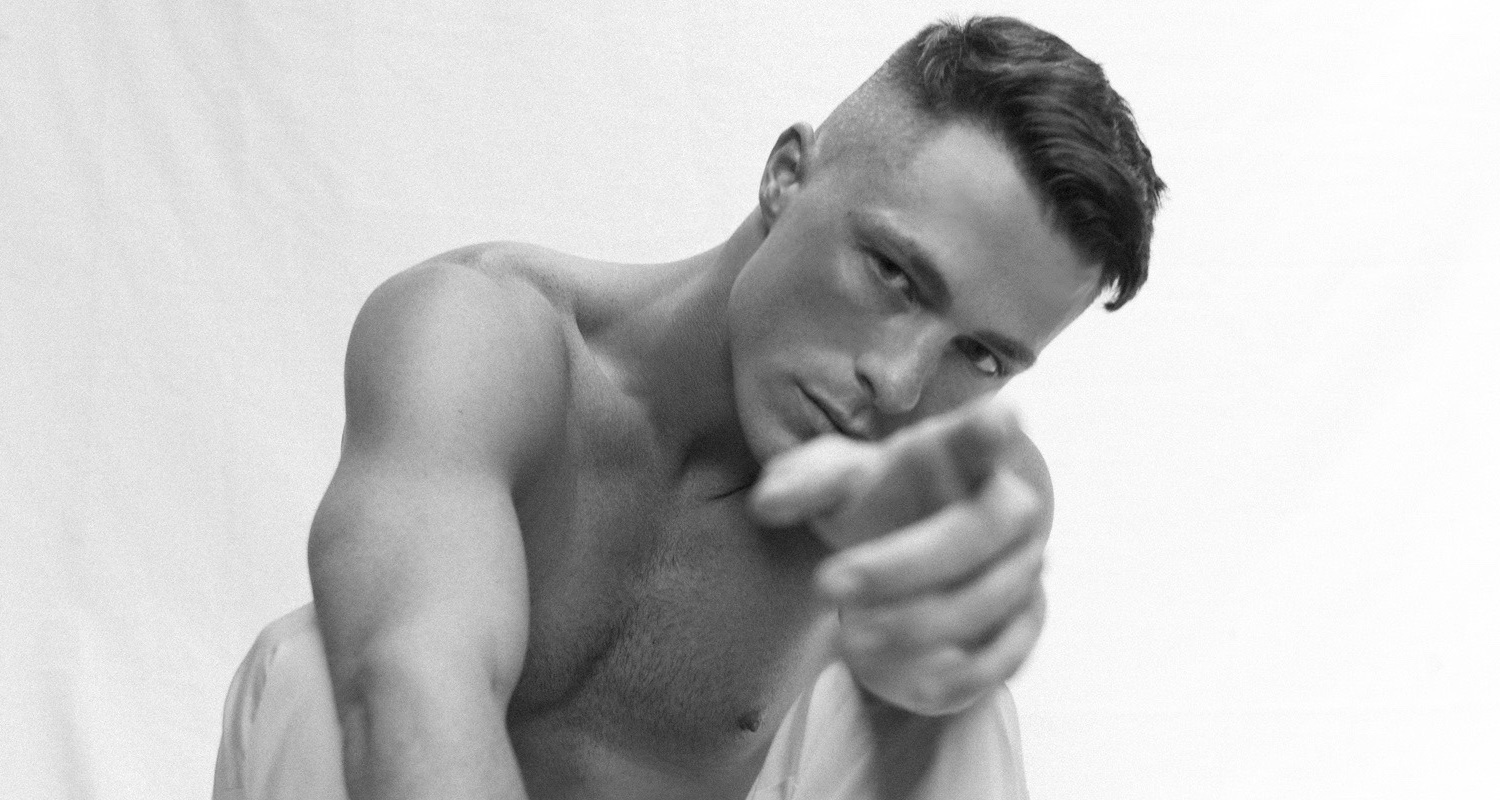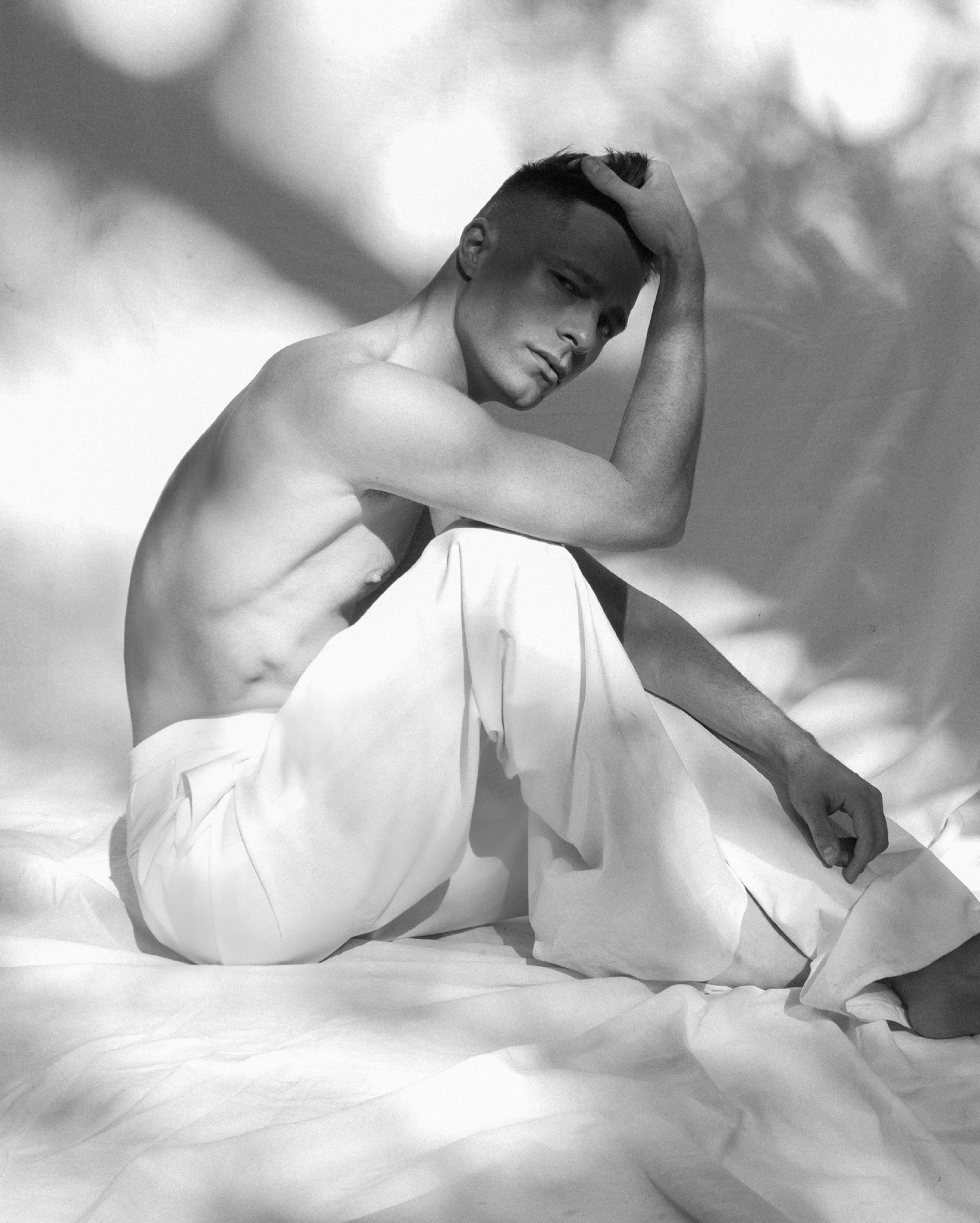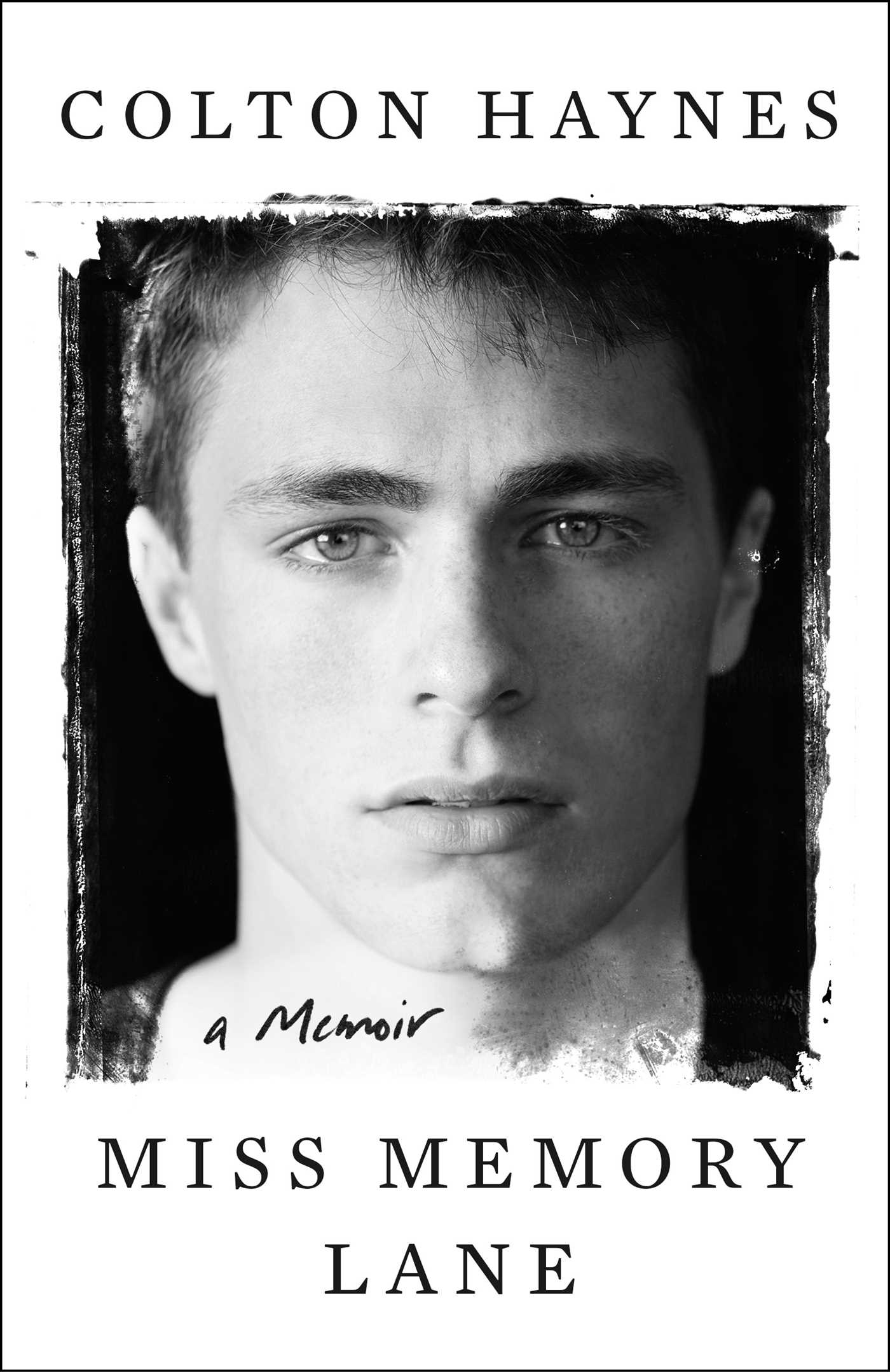How Colton Haynes was forced to reckon with his past while writing first memoir Miss Memory Lane
From sexual abuse and addiction to Hollywood homophobia, Teen Wolf star Colton Haynes tells Gary Grimes about sharing full, unfiltered story.
By Will Stroude

Words: Gary Grimes; Photography: Nino Muñoz
“Is there gonna be a warning on this book?” Colton Haynes asked his editor whilst putting the finishing touches on his memoir Miss Memory Lane. “I was worried that people are going to buy this book and think I’m going to be talking about, like, my on-set life on Teen Wolf,” he explains to us with a chuckle.
Indeed, if you’re after titillating gossip from behind the scenes of the hit MTV supernatural drama, we’re afraid you won’t find much of that in this book. Miss Memory Lane is instead a savage account of Haynes’ tumultuous upbringing, his battle with addiction, and his unwavering pursuit of fame.
The actor and model wastes no time in shattering any preconceived notion the reader might have of both himself and what the book will be about. Within the first 20 pages, we’re already deep into the story of his drug-addicted, alcoholic parents who met in rehab before escaping together to live a life of misadventure, family and, unfortunately for his mother, extreme domestic violence. Although the bright lights of Hollywood always loom close in Haynes’ mind as an adolescent, he makes sure to differentiate screen from reality when it comes to his home life, writing: “It wasn’t like a movie—where the abused woman has a scrape, or a black eye. When my dad was finished with my mom she was purple and black.”
Before we’ve had a moment to readjust our view on the actor’s life, we’re introduced to Uncle Tommy, his father’s brother, who we learn molested Haynes at the age of just six in his backyard, and later died of AIDS before the star ever had the chance to confront him over his abuse.

Photography: Nino Muñoz
Sadly, this is only the beginning of Haynes’ experience of sexual abuse in his youth. The lion’s share of his high school experience is dominated by the presence of a police officer who runs an after-school programme in his school. At first the man, referred to in the book as ‘Damon’, appears to be something of a guardian figure in the troubled teen’s life – albeit a guardian he has a pubescent crush on – offering him rides to musical theatre rehearsals and looking out for him in the hallways.
Things take a sharp turn for the perverse one afternoon when Colton makes a subtle pass at Damon who then swiftly leads him to his laundry room and calmly instructs the teen: “Get on your knees.” Colton is aged 14, Damon is 42.
The pair begin a sexual relationship which includes overnight trips Damon is chaperoning and blowjobs underneath the cop’s desk in school. Haynes writes about these days with such a romance and warmth that, for a brief moment, you might forget you’re reading the harrowing account of an extremely vulnerable 14-year-old being groomed for routine sex by a law enforcement officer.
Haynes says he was aware of this uncomfortable dichotomy for the reader. “It can tend to be very sexy,” he admits. “It wasn’t in there originally, but after talking to my editor I wanted to remind the audience at the end of that chapter that I was 14, and he was 42.”
To this day his ‘relationship’ with Damon is still a point of conflict for the actor. “It’s such a tricky thing because I obviously now see that was clearly wrong, but I genuinely was in love with this man.” In fact, in Haynes’ retelling of the story, he recalls how at the time he considered himself to be the ‘predator’ who pursued this older man.

Photography: Nino Muñoz
“All of us as kids or teenagers think we’re not a kid, we act like one of the adults, we’re old souls,” he continues. “But when it comes to sexuality and being objectified in that way, I was definitely still a child. So now I look back at it and it’s extremely sad.
“Looking back, I was in love with that man because I didn’t have that love from my father,” Haynes explains. “Seeking that [love] by using my body is clearly something that has damaged a lot of my relationships as an adult, but it wasn’t until writing the book that I realised it wasn’t my fault.”
Peppered amongst these accounts of genuine horror are many tropes familiar to fans of the gay celebrity memoir genre – bedroom walls adorned with posters of Christina Aguilera, living room performances in his mother’s high heels, fist fights with his brother after forgetting to wipe ‘police porn’ from the search history on the family computer, and, of course, a burning desire to get the hell out of whichever small rural town he found himself in at any given age.
Aged 17, Haynes found seemingly good fortune via MySpace message, an opportunity he felt certain would be a pivotal stepping stone to world domination. Underground queer magazine XY had come across photos of him and his teenage boyfriend and wanted to organise a photoshoot with them. Despite his boyfriend’s reservations over the publication’s typically sexually-charged content, the pair agreed and ended up gracing the magazine’s front cover.
In the issue’s cover shot, a teenage Colton lies shirtless on a bed, gazing into the eyes of his similarly scantily-clad boyfriend who holds his wrists back behind his head. The headline reads simply: “Shocking.” It was the then-aspiring model’s first magazine editorial and a statement of his pre-fame pride and sexual liberation.
View this post on Instagram
“When I got that message on MySpace, it felt like my big break for some reason,” he recalls. “It felt like a way of me being able to throw my sexuality out there in a way that I obviously wasn’t in the real modelling world – not knowing that that’s not necessarily the image a lot of people want if you’re trying to break into the industry.”
However, later in Colton’s Hollywood career as a supposedly straight teen idol, this photoshoot would live on as the ultimate skeleton in his so-called closet. In a bid to protect his heartthrob image, his team went to extremes to suppress the images from reappearing on even the darkest corners of the internet. How could something that was once so joyous and defiant become such an Achilles heel?
“Then I was super ashamed of it,” he admits. “I did whatever I could to sue people who were posting it. It was mostly my team but I just went along with it.” Of his involuntary regression back into the closet in his twenties, Haynes writes poignantly: “It didn’t matter who was on my team, the message I got was always the same: You will not work if you are yourself.”
“Now I look at those photos and I love them,” the actor says. “I just think they’re so genuine, they’re so real. They capture exactly the moment I was living in. It wasn’t an act, that was pure. It was just me presenting my queer self to the camera.”

Photography: Nino Muñoz
In what would have been both a marvellous full circle moment and a genius PR move, Haynes even considered suggesting to his team he shoot a 2022 cover for XY to promote this very memoir. However, relations between the actor and publication have soured in the years since his magazine debut he explained.
“I don’t think XY is very happy with me,” he laughs. “I’m always in a battle with them because they don’t want to say the age that I was.
“Every time I talk about it an interview, one of the editors always feels the need to pop into the comments and clear up that I wasn’t underage. And I’m like, ‘Um, yeah I was. I even have the consent form because I never turned it into you.’”
As with any celebrity memoir, you read it with anticipation of what you already know happened to the individual later in their life. You turn each page patiently waiting for their big break you’ve known was coming since the very first page. The turning point after which everything starts to fall into place like they’ve always hoped.
Haynes reminds us at every opportunity throughout his tumultuous adolescence that one thing remained constant – his steely focus on achieving fame, at the expense of almost any relationship in his life. We, the reader, know that he’s eventually successful in this endeavour and so we eagerly await the glittering lights of the Hollywood hills to come into focus – for the good life to finally commence. And sure enough, after we reach his breakout role in Teen Wolf, there is a notable shift in the book’s tone – but sadly it is not a positive one.

Photography: Nino Muñoz
Despite the many challenges and traumas he endured throughout his childhood, Haynes writes about his early years with genuine nostalgia. However nearly everything that takes place post-Teen Wolf is written with a distinctly cold misery. We learn that as a newly-closeted celebrity, Haynes’ private life plummets into the depths of addiction, shame and disordered eating. Work opportunities see him relocate for filming purposes to new cities like Atlanta and Vancouver where he lives a lonely, secluded life of mostly drinking alone in palatial apartments. He’s too afraid to go out or express himself in public for fear of being recognised. It’s an age-old story of ‘Be careful what you wish for ‘cos you just might get it’.
Similarly, we trundle through these years of fame knowing that, of course, Haynes eventually did famously come out in 2016. And so, we wait for this watershed moment in his life and career, for the end of secrecy, an act of true liberation after which he can breathe a sigh of relief and begin a fulfilled and happy life! And it comes.
“Maybe I shouldn’t have waited so long?” he recalls, pondering in the moments after his interview with Entertainment Weekly goes live which included the first official public acknowledgement of his homosexuality. “I felt whole for the first time in what seemed like forever,” he writes.
Depressingly, but also typically of this book, the moment of joy is short-lived. Not even a paragraph later, the writing’s on the wall for the newly out and proud Colton, who writes: “Within a few weeks, the endorsements that had been keeping me afloat financially dried up.” His agent laments his decision to be his authentic self in public and, after learning that the only scrap of work on the table for him was a brand deal to be the face of Grindr, Haynes pours himself another drink.
Things reached a head in 2018 when, in the wake of his mother’s death by alcoholism, he finds himself in the famed Betty Ford Clinic after surviving a near-fatal overdose of alcohol and Xanax which left him first comatose, then awake but unable to walk or see out of his left eye. Hayne’s 30-day stint in the infamous rehabilitation centre marked the beginning of his sobriety journey, a road he has managed to remain on for now four years, and one which ultimately led him to pen this memoir.

Photography: Nino Muñoz
As for what exactly is next for Haynes, it’s not clear. He’s played the fame game for the last decade and has arguably both won and lost. In this memoir, Colton fans will be reintroduced to the star they thought they knew and, truth be told, they’re probably in for some nasty surprises. But they’ll also be introduced for the first time to Colton Haynes, the genuinely gifted storyteller. Throughout Miss Memory Lane, Haynes writes with a wicked sense of humour and a dead pan delivery that will leave you unable to help but laugh, even at some of his story’s lowest ebbs.
On the other end of the spectrum, the book’s climatic final pages which detail the moments just before his overdose are a masterfully written portrayal of the desperation and self-loathing felt at life’s nadir. As a lifelong nostalgic, he constantly finds moments of circularity in his story which give us a satisfying sense of closure by the end of the book. In fact, after reading this memoir it doesn’t feel farfetched at all to imagine Haynes enjoying a fruitful career as a writer in the future.
In the acknowledgements for Miss Memory Lane, he dedicates the book to “all the queer kids who longed for love and attention.” It’s an appropriate note on which to finish a story that’s ultimately about chasing fame to substitute for parental love and inner-confidence, and learning the futility of that ambition the hard way. Perhaps in a bid to save someone else the trouble, he also imparts a closing piece of advice to his young, queer, attention-starved reader and also, we hope, to himself: “To the ones who break their own arm, if only to have somebody sign their cast, know that you’re deserving of love without pain.”
Miss Memory Lane by Colton Haynes is out now.

